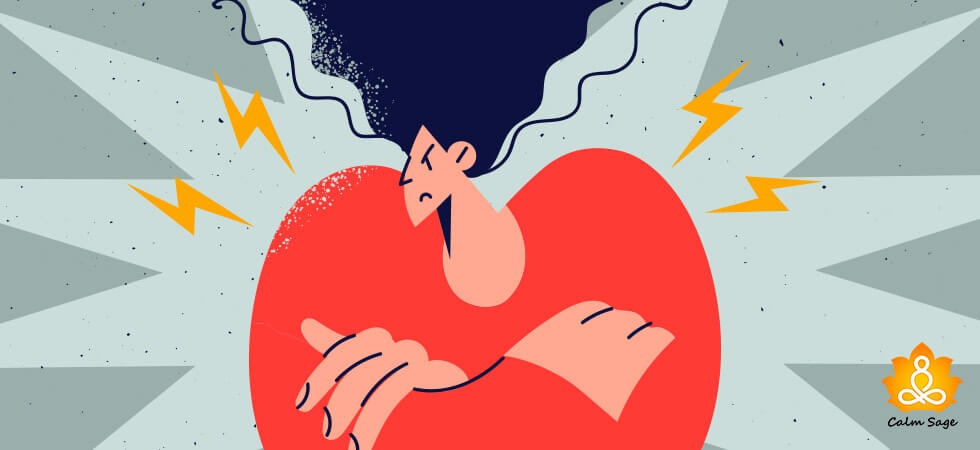Displaced Anger Can Be Destructive: How To Deal With Displaced Anger In 5 Steps

Your coworker made a mistake at work that put you and your team back on your progress but then you come home and see that your partner forgot to do the dishes from the morning. As soon as your partner comes home, you turn on them and release your anger on them, leaving them confused.
But is it fair, though?
Releasing pent-up emotions is good but what if the target of your anger isn’t the one who caused it in the first place? Is it fair? This is what we call displaced anger.
Displaced anger is a reactionary defense mechanism that causes you to direct your anger at someone or something that is not the source and is completely unrelated to the cause of your anger and stress. This reaction, while displaced, can still contribute to the stress response, making the situation worse.
In this blog, let’s take a look at what is displaced anger, what causes it, how it affects your behavior, and how you can deal with displaced anger.
What Is Displaced Anger?

In psychology, displacement is a defense mechanism that can also be considered a self-soothing method. Displaced anger is a defense mechanism that causes continued negativity and can end up in a vicious cycle of never-ending arguments. People who are prone to displaced anger have poor impulse control and higher aggression.
These people also lack healthy coping skills so they cannot control their emotions. Because of poor emotional regulation, they often channel their anger on people or events that are completely unrelated to the source of their anger.
How Displaced Anger Affects Your Relationships?
People who are prone to displaced anger are more likely to lash out at children as children need a higher level of patience and understanding than most adults so they become an easy target. Children who are a victim of displaced anger can grow up to struggle with lifelong emotional wounds.
Anger displacement can have a ripple effect. For example, a male partner lashes out at the woman partner, who in turn, lashes out at the children, who might or might not take that out on their friends and peers at school. When this pattern keeps happening, it can become toxic. To prevent anger displacement disorder, it’s important to address and correct the issue before it becomes worse.
Displaced anger can also be an aftermath of grief. While anger is quite normal during the stages of grief, it can draw a line and make you push away your loved ones. Displaced anger in grief or any other instance can chip away at the foundation of a relationship and trigger unpleasant emotions in the other person, making them feel emotionally drained.
If this pattern is left unchecked and unaddressed, then eventually it can become a repetitive thing and cause conflicts.
Causes Of Displaced Anger in Relationships

Displaced anger can come from toxic or traumatic childhood experiences that affected the mental and emotional development of the child. The causes can include but are not limited to emotional abuse, physical abuse, sexual abuse, bullying, divorce of parents, or being a victim of domestic abuse.
To cope with unexpected and unexplained emotions, children may resort to bottling up their feelings or minimizing their feelings to avoid facing them.
With time, as the emotions fester, this behavior may cause them to displace their unpleasant emotions – externally or internally. Externally, displaced anger can manifest itself as lashing out at another person (who’s unrelated to the source of anger). Internally, displaced anger can manifest itself as self-blame and emotional dysregulation.
How To Deal With Displaced Anger?
Dealing with displaced anger can be challenging because it’s not easy to handle conflicts whose source comes from someplace else. Here are a few tips to help you deal with displaced anger:
1. Disengage From The Source
This can sound counterproductive but you need to disengage from the situation first to stop displacing your anger. Disengaging can help you weaken the heightened emotions of the angry person and make them see the source of the anger, which is not you or their current situation. Retracting yourself from the anger can help the angry person see clearly.
2. Reach Out To A Trusted Person
If you’re having trouble disengaging from the anger, then it’s a good idea to allow yourself some space and maybe reach out to a trusted friend or family member. Talking about it rather than reacting to the issue with a trusted person can help provide a perspective and approach the situation differently when you come back.
Also Read: 10+ Signs Of An Untrustworthy Person That Shouldn’t Be Ignored, According To Experts
3. Engage In Self-Soothing
To keep the anger from internalizing, focus on self-soothing and comforting yourself. You can try meditation, deep breathing, or any form of cathartic emotional expression. This step can effectively help distract your anger.
4. Take A Breather
After you’ve taken the time to self-soothe and take a breather, come back to the situation. Make sure the time you took was enough and helped with the misplaced emotions. When you’re truly ready to discuss the event, make sure you take in the perspective of how the anger of your partner made you feel instead of accusing the person.
5. Get Professional Help
Sometimes, angry emotional outbursts and conflicts can be tough to navigate and need different, more professional help. Such conflicts might need a different communication style or coping techniques than the ones above. If left unchecked, this situation can make you feel depressed, anxious, and more stressed.
Getting professional help either as a couple or individually can help manage the turbulent emotions and they can help come up with better solutions and coping mechanisms.
Displacing Your Anger on Someone Is Never The Solution
Connect with Therapist Now and Get 20% off
Whatever you’re struggling with is unique to you but you’re not alone in your struggles. If you’re dealing with displaced anger in your relationship, then the above-mentioned steps might come in handy, or talking to a therapist might be a good choice.
With the right steps and help, you can learn to deal with your own displaced anger and emotions as well as that of your partner, family member, or friend.
I hope this blog helped you understand what is displaced anger and how to deal with displaced anger. For more, you can write to us at info@calmsage.com or DM us on social media. You can also share your tips and thoughts with us in the comments section below.
Take Care!




















